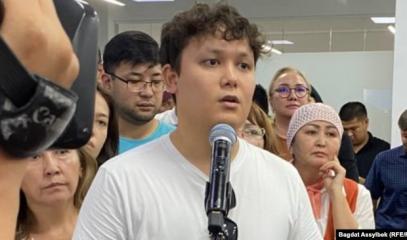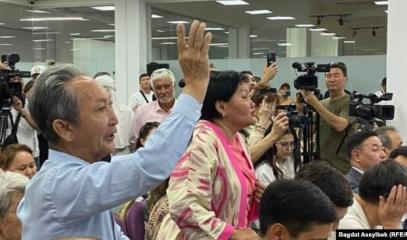Almaty: Security concerns behind clash over nuclear development
In Kazakhstan, the topic of developing new nuclear power plants to meet energy needs is a hot topic with public debates and discussions. Gas reserves are not enough and Uzbekistan prefers trade with China. Ties with Moscow and the prospect of a public referendum among the population.
Moscow (AsiaNews) - A very lively public discussion was held in Almaty, the southern capital of Kazakhstan, on the project to build a new nuclear power plant. Speakers explained the need to proceed in order to obtain a stable source of electricity; however, many voices were raised in the audience who were against, concerned about ecological safety, economic feasibility and the many possible consequences of the new plant's activities.
As promised by the government, the issue has been given the opportunity to discuss it publicly in various venues (about 20 so far), as it happened in the Almatygenplan building on Abaj Prospekt in Almaty since 9 am on August 26, in an auditorium packed with mostly elderly people, under police control. I
n the front rows sat representatives of the metropolis’ Social Council, called to support the speakers sent by the Ministry of Energy, the Institute for Atomic Energy and the Institute for Nuclear Physics.
In the central sector sat ecologists and other citizens sensitive to the issue, who displayed signs with the words “The people of Kazakhstan against the referendum on the AES”, the nuclear power plant, and “Whoever supports the AES is an enemy of the people”.
Gulmira Mursalovaja, deputy director of the ministry's Department of Atomic Energy, tried to explain the need for the initiative with the help of images, comparing it with existing reactors in the world and indicating the values of uranium extraction in the country, the material needed for nuclear fuel.
The director of the National Atomic Center, Erlan Batyrbekov, spoke about Kazakhstan's serious energy deficit, which can be addressed in three ways: hydroelectric, coal or atomic generation, whichever is most appropriate.
Physicist Sajabek Sakhiev assured that there is no need to fear nuclear energy, and that an experimental reactor has been operating in his laboratory that has been producing medical radioisotopes for over half a century.
The interventions of the public sought to explain the risks as well as the advantages, and some asked why gas-fired power plants cannot be built. The presidency explained that there is not enough gas in Kazakhstan, and there is very little hope of obtaining it from Uzbekistan, as the Uzbeks practically only sell to the Chinese.
Some accuse those responsible for the discussion of "just organizing an advertisement for [Vladimir] Putin and other atomic corporations", considering that the project would be financed mainly by Moscow.
Many believe that the power plants already under construction are sufficient, fueled by gas produced in western Kazakhstan, which "comes from Russia anyway".
The government assures that participation in the financing will be diversified, and in addition to Russia there will also be companies from France, South Korea and China.
For some, nuclear power plants "are the business of more economically powerful and technologically advanced countries", and it would be more appropriate to modernize the existing plants, several of which are now on the verge of permanent closure.
Among those present, many expressed their distrust in the government of Astana: "We've been told since we went to school that we'll make it, there are proclamations and demonstrations, but we're always at the same point" said the young Berikbol, who says "I want to build my own future!".
The director of the company “Nuclear Power Plants of Kazakhstan”, Timur Žantikin, finally explained that the costs of the project vary between eight and 11.5 billion dollars, without giving detailed explanations, recalling that the Akkuju plant recently built in Turkey with the Russian company Rosatom cost 25 billion dollars.
The tariffs depend on many factors: the Turkish plant produces at 12.25 cents per kWh, while in the US the tariff is three cents and in China six. At the end of the discussions, probably in the fall, a referendum is planned in all regions, but the date is still pending, trying to carry it out in a “constructive” climate, as stated by President Kasym-Žomart Tokaev.
02/09/2017 13:09










.png)










